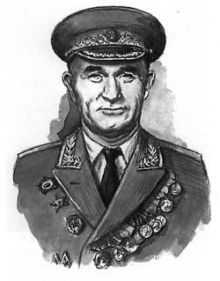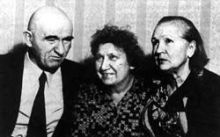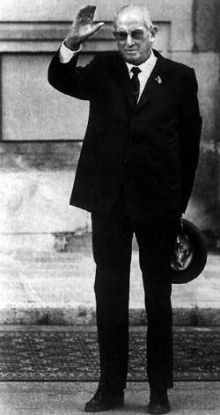”I don’t think that someone else’s life can be an example for others. Everyone carves out their own path. If what I have recounted can serve as food for thought for anyone, I will believe that my work was not in vain,” General Petro Hryhorenko wrote in his memoirs. Today, many years later, it is very clear that he did not work in vain, and his life is a lesson to all those for whom truth and decency are not abstract notions.
Petro Hryhorenko was born on Oct. 16, 1907, in the village of Borysivka, (today: Prymorske district) in Zaporizhia oblast. His mother died when he was three years old, and he attended a secondary school in Nohaisk. In the spring of 1918 Petro and his brother Ivan tried to enlist in the Red Guard in Berdiansk by pretending to be older. But their father quickly tracked them down. He told Ivan, who was just 15, “You are too young, but you’ll have plenty enough wars to fight in.” These words could also apply to Petro, who later enrolled in the Civil Engineering Faculty of the Kharkiv Technical Institute.
At this time an event occurred, which led Hryhorenko to a gradual understanding of the true nature of the system that proclaimed itself the most humane and righteous order In the summer of 1930 Hryhorenko the student was a member of a group of representatives sent by the Central Committee of the Communist Party of Ukraine to bring in the crops. They were briefed by the party’s General Secretary Stanislav Kosior. The future human rights champion remembered that briefing all his life.
“The peasant has devised a new tactic,” Kosior sermonized. “He is refusing to gather the harvest. He wants to destroy the grain in order to strangle the Soviet power with the bony hand of famine. But the enemy is mistaken. We ourselves will force him to know what famine is. Your task is to thwart the kulak tactics of hindering the harvest campaign. Everything must be gathered right down to the last seed of grain and immediately delivered to the state.” Kosior’s speech made a horrible impression on Hryhorenko. This is probably why he never became a Komsomol or party activist. Instead, he opted for a military career. What led him to make this decision was a commission that came to the institute to recruit students to the Leningrad-based Military and Technical Academy. Incidentally, a Gypsy woman had once prophesied that Hryhorenko would become a military man. The prophecy came true.
Hryhorenko became a cadet at the Military Engineering Faculty in 1931. Later, this faculty formed the nucleus of the Moscow Military Engineering College from which Hryhorenko graduated in 1934. He was left at the college to pursue advanced military studies. He showed character and persuaded none other than Deputy People’s Commissar of Defense Mikhail Tukhachevsky to appoint him chief of staff of the separate engineering battalion of the 4th Rifles Corps. He believed that you should practice what you learn. Tukhachevsky appreciated Hryhorenko’s resolute position, and when he was about to leave the famous general’s office, Tukhachevsky stopped him and said, “Remember that the uniform you are wearing and all that is connected to it is for life.” The point here is that graduates of the fortifications faculty where Hryhorenko had just completed his studies were usually commissioned as defense construction officers, but Tukhachevsky issued an unusual appointment to Hryhorenko.
Hryhorenko took up full-time studies again in 1937 at the Moscow-based General Staff Academy. One day in early 1938 he had a visit from his brother Ivan, who one day earlier had been released from the NKVD detention center in Zaporizhia. There he saw a great number of “enemies of the people,” who were kept in terrible conditions and beaten into confessing crimes they had never committed. Ivan had not been interrogated: at the investigator’s demand, he only wrote an autobiography and comments about his bosses and subordinates. Ivan was aware that this was an object lesson — ‘this is what awaits you if you refuse to cooperate with the NKVD.’ So he boarded a train and went to see his brother in Moscow. The brothers decided to send each other weekly letters in the form of special abbreviations, a kind of code. Ivan went home, but Petro decided to seek the truth, believe it or not, from Andrei Vyshinsky, the Prosecutor-General of the USSR. He succeeded in gaining an audience with “Jaguarovich” (Vyshinsky’s nickname based on his patronymic Yanuarievich). Hryhorenko told him about his brother Ivan’s plight. “Now I know,” Hryhorenko reminisced later, “what kind of person he was; what a horrible role he played in the Stalinist terror. But I must admit frankly that at the time I was overwhelmed by the importance of this person.”
Unbelievably, this “important person” helped. A Moscow commission came to Zaporizhia, the investigators who had resorted to tortures were dismissed, and the prisoners whom Ivan had met began to be released. “I was glad and finally ‘convinced’ that the party was going to put an end to this mayhem,” Hryhorenko recalled. He could not guess that his intercession coincided with the advent to power of Lavrenty Beria, who began to “cleanse” the NKVD of those who worked in a “dirty” fashion.
Hryhorenko’s wife, who had seen his correspondence with his brother, wanted to report him to the authorities. Since they had been corresponding with the aid of specially truncated words, she decided that it was some kind of code and set off to the Lubianka early one morning to inform on her husband’s “espionage.” Hearing her leave the apartment, Hryhorenko stopped her with great difficulty and said that it was not a spy code but a message from his brother describing what he had lived through. His wife began to cry and asked him to forgive her. “I did not condemn her,” Hryhorenko would later write in his memoirs. “Naturally, I did not rush to denounce my relative to the NKVD, but the party had made Pavlik Morozov into an iconic figure. Therefore, I was not a full-fledged communist. My wife proved to be stronger.” They divorced soon after, and Hryhorenko married Zinaida Yegorova.
Hryhorenko fought in the battle of Khalkhin-Gol in 1939. He commanded an infantry division and was twice wounded. At the beginning of the war he assessed the situation “incorrectly,” i.e., realistically. This was duly recorded and throughout the war he remained in the rank of lieutenant-colonel, although he held the position of general. He was not promoted to general until early February 1945. Nevertheless, he would eventually be reminded of his “incorrect” utterances. During the war Hryhorenko met Leonid Brezhnev. They did not exactly like each other, perhaps because Hryhorenko quickly saw through the future General Secretary.
In 1945 Hryhorenko began teaching at the Frunze Military Academy. An incident that took place at this time became a turning point in his life. “That was the most terrible moment of my life, but it was also the time of my triumph,” he wrote in his reminiscences. On Sept. 7, 1961, the birthday of his son Andrii, Hryhorenko was supposed to speak at the Communist Party conference in Moscow’s Leninsky district, to which he was sent as a delegate by the academy’s party organization. The conference was discussing the draft of a new party program that called for building communism in the USSR within 20 years. It could have been a run-of-the-mill speech followed by general applause and some proposals. But the speaker proved to be an unconventional general. Hryhorenko began to criticize Nikita Khrushchev’s policies and warned his listeners about his nascent cult of personality, declaring that the party was rife with careerism, lack of principles, and other negative manifestations that were being hushed up. The conference delegates unanimously condemned Hryhorenko’s speech (clearly, on the party bosses’ instructions).
What was to be done with the maverick general? Initially, it was decided to send him far away from Moscow. In early January 1962 Hryhorenko was transferred to the Far East as the chief of operations of a field army staff in Ussuriisk. Hryhorenko would not have been a military man if he had not struck back: on Nov. 7, 1963, he founded the Union for the Struggle to Revive Leninism, which began circulating leaflets. The organization was uncovered, and in 1964 Hryhorenko was stripped of his rank, decorations, and pension, and then arrested. On Aug 14 he was taken to a special psychiatric hospital in Leningrad.
This was still the Khrushchev era. But in October 1964 Khrushchev was removed from his post as first secretary of the Central Committee of the CPSU. He was replaced by Brezhnev whom fate had brought together with Hryhorenko during the war On April 14, 1965, a military tribunal ruled to discontinue forced medical treatment. When Brezhnev was shown the documents about Hryhorenko’s release, “dear Leonid Illich” asked where the ex-general was. Informed that he had already been discharged from the hospital, Brezhnev said, “You shouldn’t have hurried.” Hryhorenko would soon find himself in a durka (psychiatric hospital) again.
Meanwhile, released from the hospital, the former general began to work as a cargo handler. During this time he became acquainted with such Russian and Ukrainian human rights activists as Henrikh Altunian, Leonid Pliushch, Mykola Rudenko, Viacheslav Chornovil, Nina Strokata, and others. An important page in his life story is the struggle for the rights of the Crimean Tatars, which the latter have never forgotten This was the reason behind Hryhorenko’s arrest in 1969. He had once met the Russian writer Aleksei Kosterin, who drew his attention to this people’s tragedy.
On April 29, 1969, Yurii Andropov, the head of the KGB, sent a special letter to the CC CPSU with a plan to establish a network of psychiatric hospitals to be used for protecting the existing state and social order. Interestingly, that was the day that Hryhorenko gave the samizdat network his open letter to Andropov The letter described in detail what the KGB was really doing: persecuting democratically- minded people, opening correspondence, carrying out covert and open searches of the homes of those who were critical of the government, tapping telephones, spreading slander about specific people via the press and the party propaganda system, organizing special provocations, and framing people who opposed the authorities. Hryhorenko illustrated all this with concrete examples and through his own example showed the cost of surveillance in Soviet rubles.
On May 2, 1969, Hryhorenko was arrested in Tashkent, where he was supposed to appear as a public defender at the trial of the leaders of the Crimean Tatar movement He was re-arrested on May 7. There were interrogations again, and an expert examination in Moscow pronounced him mentally ill. On Feb. 27, 1970, Hryhorenko was sent to a special psychiatric hospital. Professor Andrei Sakharov, the father of the Soviet hydrogen bomb, began his human rights struggle in 1969 by coming to the defense of General Hryhorenko. In 1971 the psychiatrist Semen Gluzman, who was working in Zhytomyr oblast, carried out an independent examination of the Hryhorenko case and proved that the psychiatric treatment methods applied to him were unlawful. He obtained all the necessary documents from Moscow-based dissidents and wrote a conclusion (as Semen Fishelevych told me, he was not fully aware of the likely consequences of these actions). The consequences became clear very soon: Gluzman was arrested that year and sentenced to a seven-year term in a prison camp and three years of internal exile.
Hryhorenko was released on June 26, 1974. He left notes about his 6.5-year incarceration in a psychiatric hospital. The human rights champion wrote, “The idea of special psychiatric hospitals is not bad in itself, but when it comes to the specific way it is being implemented in this country, there is nothing more criminal and antihuman.” The trouble is that this field was entirely taken out of public control and handed over to hand-picked apparatchiks.
Doctors were carefully selected to work in psychiatric clinics: medical skill played no role whatsoever; what mattered was the ability to obey and conceal one’s medical ego.
Hryhorenko’s memoirs, entitled You Can Only See Rats Underground, were published in 1981 in New York and reprinted in the USSR in 1990. The title is evocative because such figures as Hryhorenko resisted the attempts of the KGB and the entire Soviet regime to drive the human rights movement underground and tried to express their views openly and legally, as though they were living in a truly democratic society, where “one breathes so freely.” This assumed special importance after the USSR signed the Helsinki Accords in August 1975. Earlier, the USSR had abstained when the UN was voting for the Human Rights Charter. But when the Kremlin signed the Charter, a different politico-legal reality was created because it was about recognizing human rights, basic freedoms, and the right to know these rights and duties and act in compliance with them.
One of the results of this was the growth of a dissident movement in the USSR: in May 1976 Sakharov’s comrade-in-arms, Professor Yurii Orlov, founded a Moscow civic group to monitor compliance with the Helsinki Accords, followed in November 1976 by the founding of a Ukrainian group and later, its Lithuanian, Georgian, and Armenian counterparts. Hryhorenko was the co-founder of the Ukrainian Helsinki Group. The members of these groups behaved as if they lived in a free country, and the main method of their struggle was adherence to the ostensibly democratic Constitution of the Soviet Union, the General Declaration of Human Rights, and the Helsinki Accords.
In 1977 Hryhorenko was taken ill. Together with his wife and son Oleh, he was allowed to travel to the US for medical treatment. He was stripped of Soviet citizenship three months after his departure. Hryhorenko died in the US in February 1987 and is buried in Bound Brook, New Jersey, at St. Andrew’s Ukrainian Cemetery.
As Tukhachevsky had once predicted, Hryhorenko remained a military man: he was reinstated (posthumously) in the rank of major-general in 1993 by a decree of Russian President Boris Yeltsin. A monument to the unconventional general was erected in Symferopil. If you have a chance, please lay some flowers there. Petro Hryhorenko deserves this.









